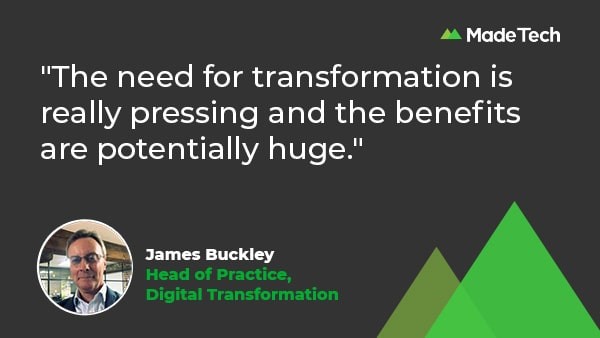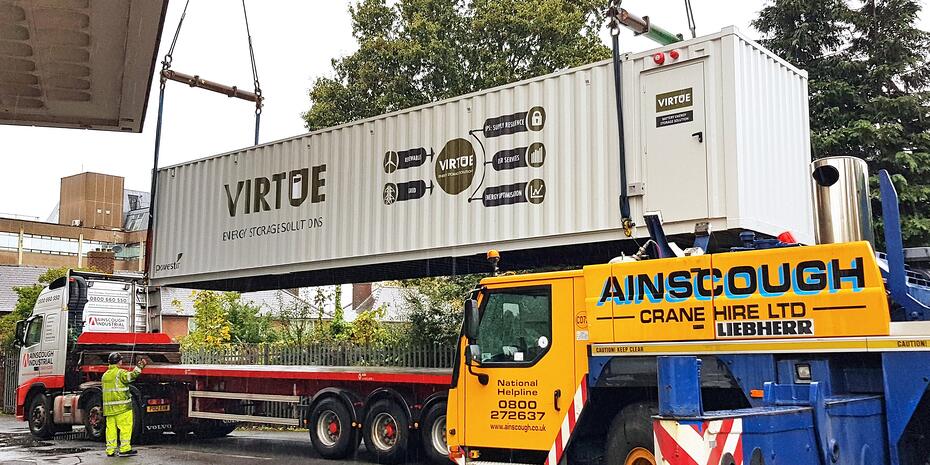
Digital transformation is a phrase you’ve probably been hearing for a while now. The problem is, it’s often overused and misinterpreted. So what does it actually mean? In a nutshell, digital transformation is about using digital tools and technologies to create significant change in an organisation.
Okay, but why does the public sector need it?
It’s no secret that the public sector has had years of under-investment in technology. The difficult truth is that legacy systems and outdated technology means organisations are held back from modernising and making public services easier to access and use.
The need for transformation is really pressing and the benefits are potentially huge. From unlocking new opportunities for better services to easing the shift to online services for citizens. Digital transformation can help us to not only deliver new services but cut the costs of maintaining legacy applications. This type of change can also help the public sector rethink how they operate and drive growth agendas with the added flexibility that better digital services bring. Ultimately digital transformation is about creating better digital services for the public.
How to tell if you’re ready
Looking for some clues that your organisation might need to start their digital transformation journey? Look out for some of the most common challenges across government such as the difficulties citizens can have with accessing public services online, from long waits on phone lines to waiting for important appointments to arrive in the post.
It’s well established that there’s a significant amount of ‘tech debt’ still in place across government that could also be a clue. We see this in old legacy systems built using custom code that’s maintained by large system integrators. And unfortunately some of these integrators don’t have much interest in helping the public sector modernise..
Anything to be aware of?
We’re not saying a transformation journey comes without its challenges. While they may be complex to solve, they’re simple to understand. Some of the most common blockers we see are:
Underfunding: One of the biggest reasons the public sector finds itself struggling with transformation is underfunding. A commitment to better funding will help free up organisations to be flexible, innovate and provide services that the public can access the way they want to.
Leadership: Leaders need the vision to support transformational change in their organisations. It’s worth noting here that not every organisation will see this as a challenge, but it is something we see often.
Cultural resistance: Building a culture of change can be tricky, particularly when working with organisations that have a ‘that’s the way we’ve always done it’ mentality. But by focusing on capabilities, skills and behaviours we can foster a sense of ownership in shaping a future organisation.
Technology challenges: With legacy technology and data silos that have built up over the years, leaders can find at first they don’t know the scale of the challenge. And unfortunately that means it’s often easier to renew that existing contract with those large system integrators we mentioned earlier.
Where to start: The first step is always the most intimidating. When support costs are spiralling, efficiency cuts are biting, staff have low morale and are voting with their feet; services are suffering. It can be really daunting for leaders to work out where to start.
And what about pitfalls?
Transformation programmes can be complex and very expensive. The scale of what we need to do can be enormous and more significant than you might first think. It’s important to remember that overrunning on cost and timescales is common across many large public sector transformations.
But there are things we can do to mitigate this, for example setting out a clear vision for what needs to be achieved is essential. Team this with breaking the project down into manageable steps gives us space to ‘fail fast’, learn and recover quickly.
Huge monolith programmes should be consigned to history. We need to break the cycle and replace these systems with modern open source online services that can be easily and cheaply updated when needed. But it’s not only that, adopting an agile delivery capability combined with a sense of the realities of accountability, associated assurance and approvals for spending public funds is essential.
How is it different from legacy application transformation?
We’ve been talking about legacy application transformation for a while, but digital transformation differs. Legacy in applications or infrastructure has been around for a long time, but digital transformation incorporates both of these as part of a wider piece of work.
With digital transformation we make sure to give support where a team truly needs it. Whether that’s across the whole journey from a strategy POV or assisting with particular parts of the transformation, for example the shift from on prem to Cloud, organisation redesign or data migration. In short, it’s not all or nothing.
The future of digital transformation
The future for digital transformation is bright! Today, the advantages for transforming public services are much better understood. The level of collaboration between departments and the supply chain is better than ever and we’re seeing a real commitment to tackle the issues, share learnings and build on real change in the system.
Understanding where to start is the first hurdle. Bringing specialists on board can help take away some of that apprehension. Our team have deep sector knowledge, many having been long-term civil and public servants often on the receiving end of poor delivery. With a skill set on setting the strategy and platform and delivery for a business-led, technology-enabled transformational change we can help set you up for success.
But first things first, we’re happy to chat and help you understand where to start.
If you want to know more, you can hear us talk about digital transformation and the public sector at Digital Leaders on the 14 November. Find out more and get your tickets today.








